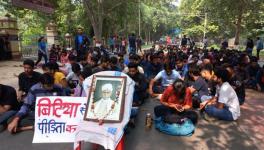The Poor State of Engineering Education in Uttar Pradesh
In Uttar Pradesh state's affiliated engineering colleges known as APJ Abdul Kalam Technical University (AKTU) colleges quality of education is an old problem. Every year thousands of seats remain vacant in colleges affiliated with AKTU. Poor faculty and poor placement is the main reason behind it. Successive governments have tended to neglect to make efforts to improve the quality of education.
On the other hand, recently Uttar Pradesh chief minister Yogi Adityanath indicated to start engineering and medical courses in Hindi from the next academic year in all the universities and colleges in Uttar Pradesh, but students and teachers are not happy with the move and term it an unnecessary move.
While interacting and discussing with several students and faculty members of different engineering colleges of the state, it was found that it is not going to be useful in any way and the actual problem is not the medium of instruction in English but better infrastructure, lack of and poor placement and training and many more, on which the government is not focusing.
Despite shutting down colleges with poor infrastructure and placements in the last five years that brought down the BTech seats from 1.5 lakhs to 75,000 seats, the university continues to struggle to fill its seats. For the academic session 2022-23, only 30,000 candidates registered for admission to around 70,000 BTech seats offered by AKTU.
In several Diploma engineering colleges of the state, employment after the completion of the course is the biggest concern of the students.
According to the students, companies don't visit for recruitment and sometimes the companies which do visit for hiring, their offered jobs are not relevant to the degrees the students hold.
Mayank Kumar, a computer science diploma holder from Government polytechnic Kanpur college said that last year a local company was hiring Computer science branch students for the role of data entry operator with a salary of around Rs 10,000.
“The course syllabus is not being taught well, especially the technical part like programming languages which most of it I learnt from private centres at my own expense. Lab work and practicals are negligible in other trades like mechanical and civil engineering too and teaching faculty is often absent,” Kumar adds.
Sudhir Kumar a retired professor from Rajkiya Engineering college Azamgarh said, “I don't think the upcoming plan to provide engineering education in Hindi is going to do any good, there are several reasons behind it like companies conduct interviews in English, that is why we have English language communication paper in the engineering courses, in MNCs (multinational corporations) work culture is English oriented, students who get their engineering degrees in Hindi may face problems in higher studies especially those who want to study abroad. Even the translation is not going to be easy and it would be difficult to translate technical terminologies. Even teachers are apprehensive of the vernacular mode of teaching a tech subject.”
The past attempt of providing engineering education in Hindi by the governments have not been successful, for instance in BJP ruled state of Madhya Pradesh, the government’s campaign to teach engineering in Hindi hasn’t gotten off to a good start. Less than 5% of seats allotted for tech courses in Hindi across the state were taken up.
Students are also reluctant to take it up, and they don't think studying in Hindi is going to serve any advantage. While interviewing several engineering aspirants who have done their schooling in Hindi medium they said given the choice they will choose to study in English medium.
Students of Hindi medium background don't find any difficulty, studying engineering courses in English and there is no huge demand from the students to provide Hindi as a medium. It seems it is only the government that is very eager to do so for any ulterior motive since students are aware of the long-term benefits of studying in the English language.
In a fast-changing technology environment with emerging technologies like Artificial Intelligence (AI), the focus of the government should be to equip colleges with the latest technology and infrastructure but the government is taking a different route which is of no use to the students. Even in state government engineering colleges which are considered first priority for admission due to lower tuition fees, every year some seats remain vacant.
Another professor from Kamla Nehru Institute of Technology (KNIT) Sultanpur, Uttar Pradesh Santosh Kumar (name changed at his request) said, “our curriculum is vastly outdated and very slow to reach the rapidly changing industry dynamics. It is understandable that it is not feasible for colleges to find good professors for every emerging area, especially at a time when technologies are evolving at an unprecedented rate. But then you don't have to do everything on your own. For every emerging field like Blockchain or NLP(Natural Language Processing) or RPA (Robotic Process Automation), you can find brilliant courses online on the leading MOOC (Massive Open Online Course) websites, colleges can invest in enterprise licenses for the entire batch and empower them to study outside of the lecture hall.”
According to professor Kumar, "almost in every government engineering college, around 30% teaching faculty is on contract basis, there is lack of permanent teachers and some colleges even lack a permanent director which hampers the proper functioning.” The lack of quality engineering education at an affordable cost is not only a problem in Uttar Pradesh but nationwide.
Take the example of Kamlesh Kumar who has done his engineering from Kamla Nehru institute of technology in Computer Science. “After completing my degree in 2021, I could not find any job, I enrolled in a six-month stack development programme at a private institute, and with the institute's assistance, I got placed at a company in Hyderabad with the condition that I have to give 50% of my first-year salary,” he said.
Kamlesh further added, “In my batch of 35 students only 6 to 8 are working in the IT(Information Technology) sector, due to lack of placement assistance from the college most of them are working in non-technical sectors. The reputation of AKTU-affiliated colleges is not very welcoming in the job market. The typical pay offer is 3 lakh to 4 lakh that even a simple graduate can get.”
In the state's engineering colleges some even lack CDC (career development cell) and those which have- are not very active and supportive. It is only for the namesake. Lack of mentorship is the biggest issue students face. Most of them are there on their own without any proper guidance. The professors are hardly concerned about students learning, as a result, they are not guided well, which results in low-paying jobs or unemployment.
The need of the hour is proper fund allocation to colleges to tackle the poor infrastructure. In colleges like KNIT Sultanpur and Rajkiya Engineering College, Azamgarh, libraries are filled with decade-old books, which are not very relevant to the latest syllabus. Also, colleges don't have their own specific online portals where students can download the required study materials like in IITs (Indian Institute of Technology).
(The writer is a freelance journalist. Views are personal.)
Get the latest reports & analysis with people's perspective on Protests, movements & deep analytical videos, discussions of the current affairs in your Telegram app. Subscribe to NewsClick's Telegram channel & get Real-Time updates on stories, as they get published on our website.
























